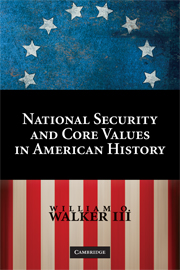Book contents
- Frontmatter
- Contents
- Preface and Acknowledgments
- Introduction: “A City upon a Hill”
- PART ONE THE ORIGINS OF THE SECURITY ETHOS, 1688–1919
- PART TWO INTERNATIONALISM AND CONTAINMENT, 1919–1973
- PART THREE THE AGE OF STRATEGIC GLOBALISM, 1973–2001
- PART FOUR THE BUSH DOCTRINE
- Conclusion: The Security Ethos and Civic Virtue
- Select Bibliography
- Index
- References
Conclusion: The Security Ethos and Civic Virtue
Published online by Cambridge University Press: 05 June 2012
- Frontmatter
- Contents
- Preface and Acknowledgments
- Introduction: “A City upon a Hill”
- PART ONE THE ORIGINS OF THE SECURITY ETHOS, 1688–1919
- PART TWO INTERNATIONALISM AND CONTAINMENT, 1919–1973
- PART THREE THE AGE OF STRATEGIC GLOBALISM, 1973–2001
- PART FOUR THE BUSH DOCTRINE
- Conclusion: The Security Ethos and Civic Virtue
- Select Bibliography
- Index
- References
Summary
The supreme interest of the United States is the creation and maintenance of a high standard of life for all its people and ways of industry conducive to the promotion of individual and social virtues within the frame of national security.
Charles A. Beard, 1935Yesterday's not dead or gone. We're just meeting it head-on for the first time in a hundred years.
William Appleman Williams, 1969Keeping the authoritarian influence of conservatism in check…is vital to maintaining our republican form of government.
John W. Dean, 2007Many Americans, particularly those who find the security ethos congenial, whether they do so consciously or not, like their history seamless, celebratory, and exceptional. They revise their own nation's history while denying others the right to fashion stories of their past absent America's influence. To the extent that America set out almost from its inception in the seventeenth century to improve humanity's lot either by example or active involvement, it arrogated to itself the right to act as the arbiter of what constitutes legitimate history. This sweeping sense of entitlement to determine how others know their own past is pertinent to a critical assessment of the authoritarianism that underlies the security ethos.
Perhaps the most enduring theme in American history is the never-ending battle between conflict and consensus as useful metaphors for comprehending the past. Efforts made to transcend this dichotomy, especially through what is called the cultural turn in scholarship, have not created a new paradigm.
- Type
- Chapter
- Information
- National Security and Core Values in American History , pp. 293 - 308Publisher: Cambridge University PressPrint publication year: 2009



